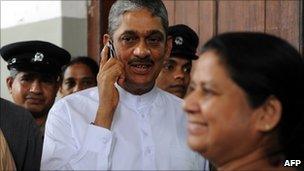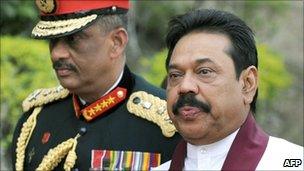Conviction just the beginning of Fonseka's woes
- Published

Gen Fonseka is likely to be spending much more time in the courts
The conviction of former Sri Lankan armed forces chief Sarath Fonseka for engaging in politics while on active service is the first of what is likely to be a series of criminal cases against him in military and civilian courts.
Experts say that the difficulty is that no-one knows exactly what he has been charged with and in what court - military or civil - he will appear to answer the allegations.
The most serious of the charges that may be brought against Gen Fonseka is the allegation that he slandered President Rajapaksa's brother, Gotabaya Rajapaksa, by accusing him of war crimes.
The general suggested that there was eyewitness evidence of the defence secretary ordering army officers to shoot and kill surrendering Tamil Tiger leaders at the end of the war in May 2009.
'Liar and a traitor'
The allegation outraged the Rajapaksa brothers.

Gen Fonseka's relations with the Rajapaksas soured at the end of the war
Gotabaya Rajapaksa worked closely with Gen Fonseka on the aggressive military strategy which crushed the rebels.
He told the BBC's HARDtalk programme in June that the general had proved himself to be a "liar and a traitor" who would be "accused of treason... and hanged" if he carried out a threat to present his evidence before any independent investigation of alleged abuses during the war.
Mr Rajapaksa's tone then was that the government was going to pursue Gen Fonseka mercilessly in the courts - and that is exactly what seems to have happened despite the concerns of human rights groups.
They say that it was grossly unfair that the general was tried by a court martial comprising three senior army officers and a judge-advocate sympathetic to his arch-rival, President Mahinda Rajapaksa.
Gen Fonseka's lawyer, Rienzie Arsecularatne, said that the sense of injustice was made worse by the fact that he was not even in court when the guilty verdict was delivered.
"They went ahead and fixed the courts martial on the days I was not available," Mr Arsecularatne said. "This is not a proper trial. This is a total miscarriage of justice."
The main opposition United National Party (UNP) has similar criticisms.
UNP General Secretary Tissa Attanayake told BBC Sinhala: "While the Tamil Tiger leader Kumaran Pathmanathan is given all the facilities and provided with security in Colombo, the man regarded by the Sri Lankan public as a hero is being ill-treated."
Critics point out that the real force behind the prosecution is Gen Fonseka's arch-rival, President Mahinda Rajapaksa.
It is he who has the authority to determine whether the punishment imposed by the court - the general's dishonourable discharge and the stripping of his rank and medals - will actually be implemented.
Given the high level of animosity between the two men - who fought a bitter presidential election campaign earlier this year - it is highly unlikely that the sentence will in any way be lightened.
In fact the government has intimated that the general faces a raft of other charges, including taking part in corrupt arms procurement deals and engaging in politics while in the army.
This last of these charges may on the face of it be difficult to pursue because many of the military's senior leaders are alleged to be involved in politics - including the president's youngest son, Yoshitha, a naval officer who has been accused by the opposition of attending political meetings.
But even if those charges do not stick, there is every likelihood that the others will, which means that that the general appears likely to be incarcerated for many more years and unable to take up his seat in parliament.